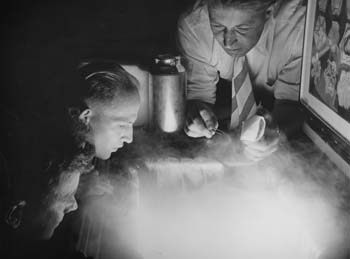Researchers of William Kennedy, Vincent Schaefer and Capital Punishment to Benefit from Federal Library Grant
 |
Gov. Mario Cuomo signs the New York State Writers Institute into being as founder William Kennedy looks on. |
Future researchers will have greater access to the papers of Pulitzer Prize-winning novelist and Professor of English William Kennedy, atmospheric research scientist Vincent Schaefer, and renowned death penalty historian M. Watt Espy, thanks to a federal grant to the M.E. Grenander Department of Special Collections and Archives at the University at Albany Libraries.
These collections will be available for research by September 2011.
William Kennedy's papers document nearly 50 years of his research, writing, and publishing. Kennedy, the founder and executive director of the New York State Writers Institute at UAlbany, is best known for his "Albany Cycle" of seven published novels all centered on his native Albany during the 19th and 20th centuries, one of which (Ironweed) garnered the Pulitzer Prize for fiction in 1984. The Kennedy Papers include working drafts of screen plays for The Cotton Club and Ironweed, and his correspondence files detail his close friendships and associations with fellow authors, most notably mentor Saul Bellow and longtime friend and colleague Hunter S. Thompson. Draft articles, notes, and magazine and newspaper clippings from Kennedy's days as a newspaper reporter with the Albany Times Union � especially for his Pulitzer Prize-nominated series of features during the 1960s and as background for O' Albany!.. are a part of the collection.
The Vincent Schaefer papers document Schaefer's monumental work on weather modification and cloud seeding at the General Electric Corp.'s Research and Development Laboratory from 1922-1953. In 1946 Schaefer became the first person to develop a successful laboratory and field method of cloud seeding the atmosphere as he worked alongside GE's chief research scientist and Nobel Prize in chemistry winner Dr. Irving Langmuir. In 1962, Schaefer was named research director of the Atmospheric Sciences Research Center (ASRC) at UAlbany, and in 1966 he became director. The ASRC celebrates 50 years of environmental sciences this fall.
 |
Vincent Schaefer (in striped tie) developed cloud seeding and co-founded the Atmospheric Sciences Research Center at UAlbany. |
M. Watt Espy Jr. spent a lifetime researching executions and collecting information on more than 15,000 individuals who were executed in the U.S. as far back as 1608. The Espy Papers are part of the University's National Death Penalty Archive, created in 2005 to document the important history of capital punishment through the acquisition of primary resources for historical scholarship. The archive was initiated by UAlbany's Capital Punishment Research Initiative at the School of Criminal Justice.
The $58,380 grant from the National Historical Publications and Records Commission (NHPRC) to the M.E. Grenander Department of Special Collections and Archives supports the completion of finding aids using Encoded Archival Description (EAD).
The NHPRC is the only federal agency that provides grants specifically for archives. UAlbany's Special Collections unit was one of 13 repositories nationwide to receive a detailed processing grant, a competitive grant for projects with a national scope.
Associate Librarian and Head of the M.E. Grenander Department of Special Collections and Archives Brian Keough is principal investigator and project director for the grant.
"EAD is a de facto professional standard for the XML encoding of finding aids that provides greater full-text searching of finding aids within and across repositories," said Keough. "Finding aids are detailed indexes, or guides that are created by archival and manuscript repositories to provide detailed information about specific collections that are crucial to the historical research process."
![]() For more news, subscribe to UAlbany's RSS headline feeds
For more news, subscribe to UAlbany's RSS headline feeds


